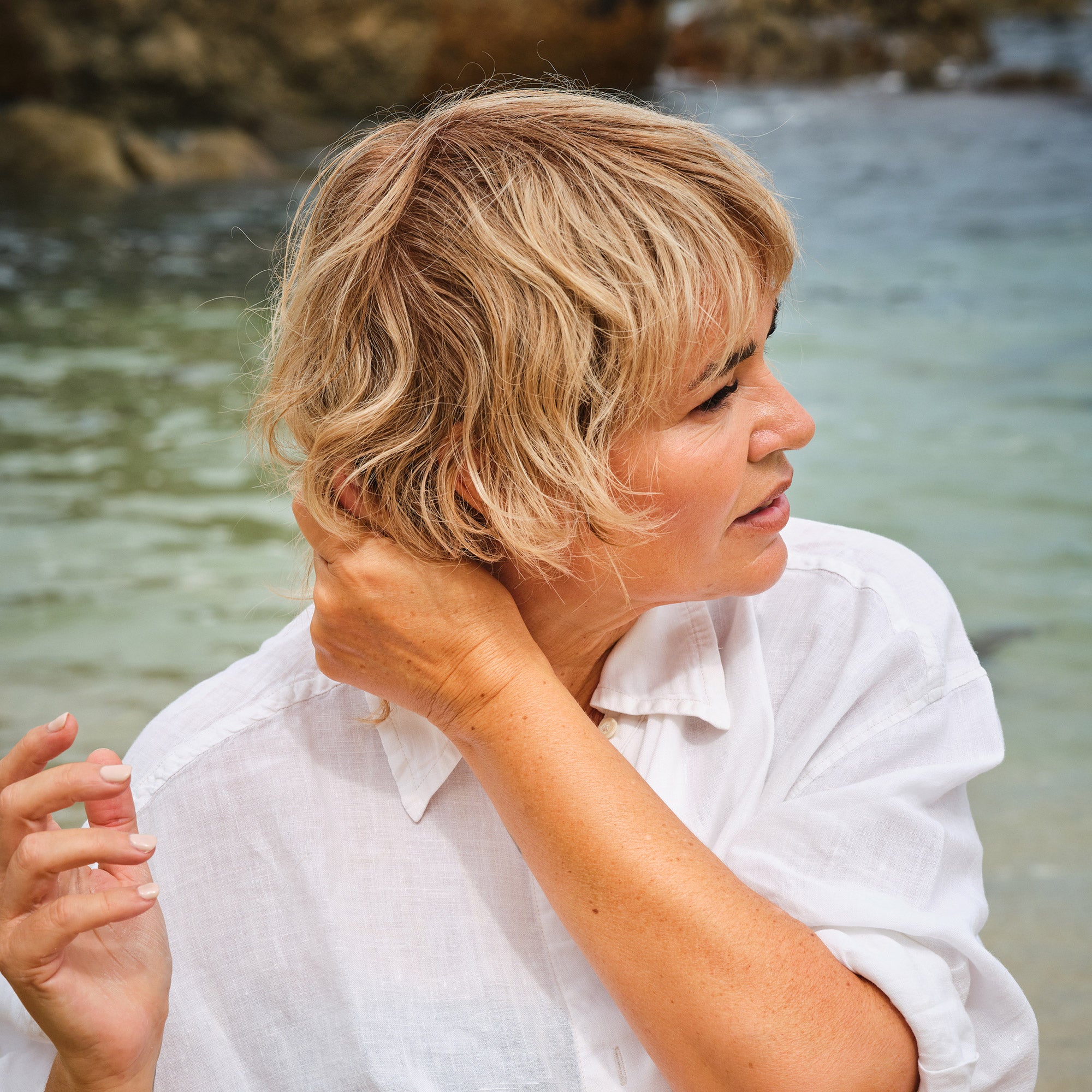Does menopause cause hair loss?
Unfortunately, yes, menopause can cause hair loss, and it’s a common concern for many women. The primary reason is the hormonal changes that occur as oestrogen and progesterone levels decline. These hormones are critical for maintaining the hair growth cycle, particularly keeping hair in the anagen (growth) phase. When their levels drop, hair may spend less time in the growth phase and more time in the telogen (resting) phase, leading to increased shedding.
Additionally, menopause often brings about a relative increase in androgen levels, such as testosterone. These androgens can shrink hair follicles, leading to thinner, weaker hair and, in some cases, patterns of hair thinning similar to male pattern baldness, particularly at the crown or temples.
What about peri-menopause?
Hair loss can start as early as perimenopause, the transitional phase leading up to menopause. During perimenopause, hormonal fluctuations become more pronounced, with oestrogen and progesterone levels beginning to decline. These fluctuations can disrupt the normal hair growth cycle, causing:
- Increased shedding.
- Hair thinning at the crown or overall scalp.
- More fragile and brittle hair.
In addition, there are other factors during perimenopause that can contribute to hair loss, such as
Stress and anxiety
Hormonal shifts often coincide with increased stress levels, which can exacerbate hair shedding through a condition called telogen effluvium.
Weight fluctuations
Changes in diet or weight, common during perimenopause, may lead to nutritional deficiencies that affect hair health.
Medical issues
Emerging thyroid imbalances or insulin resistance, both more likely during this stage, can also impact hair growth.
Nutritional deficiencies
Lack of essential nutrients like iron, zinc, and vitamin D can weaken hair and promote shedding.
Can hair texture change during menopause?
Many women notice that their hair becomes finer, more brittle, or loses its natural curl. These changes occur due to reduced oestrogen levels, which affect the structural proteins and oils in the hair.
Hormonal fluctuations impact sebum production, the natural oil that keeps hair moisturised and shiny. A decrease in sebum can lead to drier, coarser hair. Simultaneously, changes in the hair follicle’s shape can affect texture, making hair straighter or wavier than before. Collagen production may also decline, reducing elasticity and strength.
Managing changes to the texture of your hair
To adapt and manage texture changes, it’s a good idea to follow these steps…
Keep your hair hydrated.
Use hydrating shampoos and conditioners specifically designed for dry or brittle hair. The Windle LAB Hydrate Duo is an excellent option. This ultra-nourishing set cleanses and conditions dry, damaged, and chemically treated hair. Formulated without sulphates, propylene glycol, or parabens, it provides a guaranteed hydration hit for ultra-thirsty hair, instantly transforming naturally dry, coarse, or brittle hair into soft, silky, and smooth strands.
Use tailored products
Use lightweight serums or creams for fine hair to avoid weighing your hair down, or consider curl-enhancing products if your hair loses its natural bounce.
If you’re finding that your curls are thinning, look at our Fine Hair Curl Regime.
The Fortifying Shampoo and Conditioner work harmoniously to gently cleanse and nourish the hair, fortified with Wheat Protein and Rooibos Tea to reduce breakage, protect strands, and deliver a fuller, thicker appearance. For an added boost, the Thickening Cream amplifies volume, while the Curl Enhancer Cream provides hold and definition, accentuating all curl patterns. To finish, Shine & Smoothing oil (Anti-Humidity drops) shield against frizz and humidity, ensuring your voluminous, bouncy curls remain smooth and manageable throughout the day.
Regular trims
Address split ends and maintain overall hair health by keeping up with trims every 6-8 weeks.
How to reverse thinning hair after menopause
While thinning hair can be distressing, there are several ways to promote hair regrowth and improve density.
Topical Treatments
Treatments such as minoxidil are clinically proven to stimulate hair growth and reduce shedding.
However, these treatments can have side effects, which include increased body hair growth, skin sensitivity, and even changes in heart rate.
Therefore, many women instead choose natural alternatives that also boost scalp circulation. Windle LAB Fortifying Shampoo for example, contains rooibos tea extract, which is rich in antioxidants and known to promote hair growth. At the same time, wheat protein penetrates hair strands to reduce breakage.
Adjusting your diet
The right food isn’t just good for your waistline; it can help to improve your hair health, too.
Be sure to include :
- Protein: Hair is made primarily of keratin, a protein. Include sources like lean meats, eggs, fish, beans, and tofu to support hair structure and strength.
- Biotin: Known for its role in keratin production, biotin is found in nuts, seeds, eggs, and whole grains. It helps maintain the strength and resilience of hair.
- Iron: A deficiency in iron can lead to hair loss. Boost your intake with leafy greens, red meat, lentils, and fortified cereals.
- Vitamin D: Crucial for follicle health, vitamin D can be sourced from sunlight, fortified foods, and supplements.
- Omega-3 Fatty Acids: Found in fatty fish like salmon, walnuts, and flaxseeds, omega-3s help keep the scalp hydrated and reduce inflammation.
- Zinc: Supports hair repair and growth. Found in shellfish, pumpkin seeds, and chickpeas.
- Antioxidants: Foods rich in vitamins A, C, and E, such as berries, spinach, and sweet potatoes, combat oxidative stress that can weaken hair.
Scalp Care
Healthy hair starts with a healthy scalp. Incorporate scalp exfoliation into your routine to remove product buildup and stimulate blood flow. Regular scalp massages using oils like argan or coconut can further improve circulation and strengthen hair roots.
Find out more about how to combine oils and scalp massage.
Hairstyling
Opt for gentle styling methods that reduce tension on the scalp and minimise breakage. So avoid tight ponytails or up-do’s, braids or using frequent heat when styling. While we know that it’s unlikely that you’ll want to completely ditch your hairdryer, straightener or curling tongs, if you do need to use heat to style your hair, choose the lowest heat settings and use a protective cream first, such as our Invisible Day and Night Spray.
Do Supplements Help with Menopause Hair Loss?
Certain supplements can support hair health during menopause, although they are not a cure-all. Effective supplements include:
- Biotin: Supports keratin production, improving hair strength and thickness.
- Vitamin D: Essential for follicle health.
- Iron: Prevents hair loss caused by deficiencies.
- Omega-3 Fatty Acids: Promote scalp health and reduce inflammation.
- Collagen: Boosts elasticity and strengthens hair.
Always consult with a healthcare professional before starting new supplements to ensure they’re appropriate for your needs.
By combining the right products, treatments, and lifestyle adjustments, you can maintain strong, healthy hair throughout menopause and beyond. If hair loss or other concerns persist, consult a professional for tailored advice and solutions.










